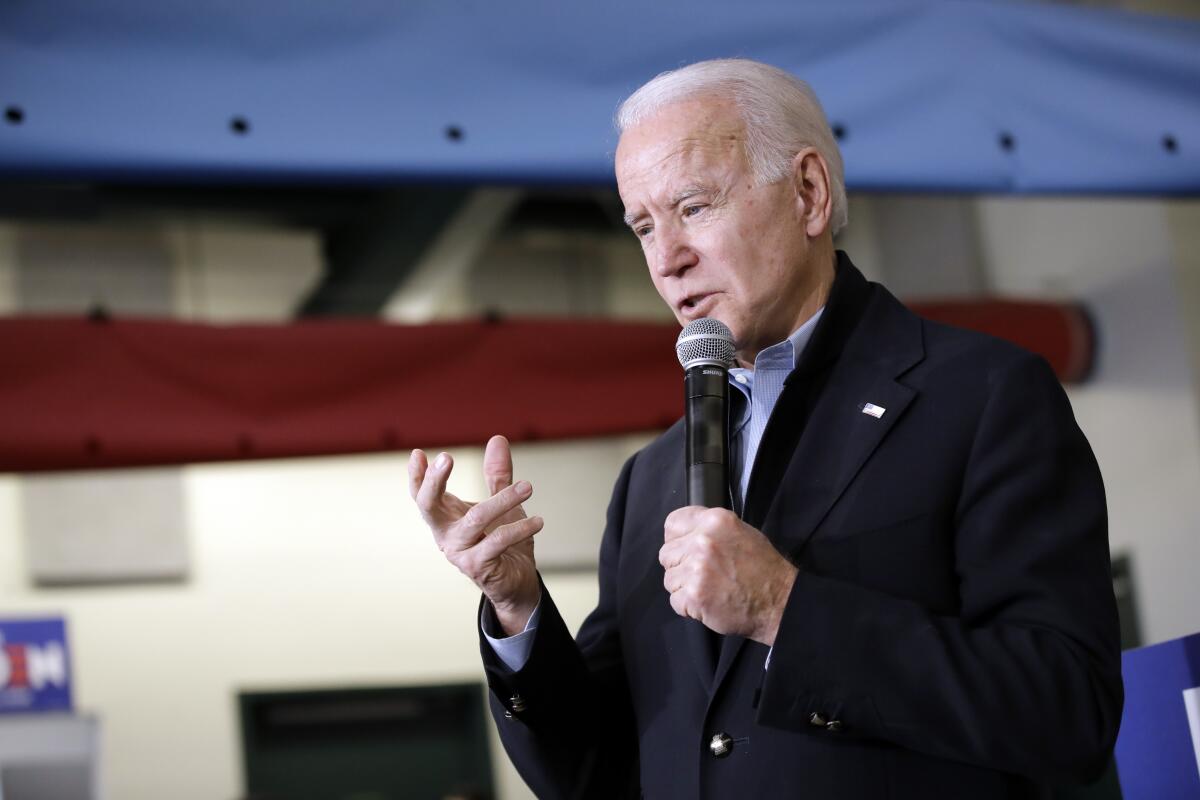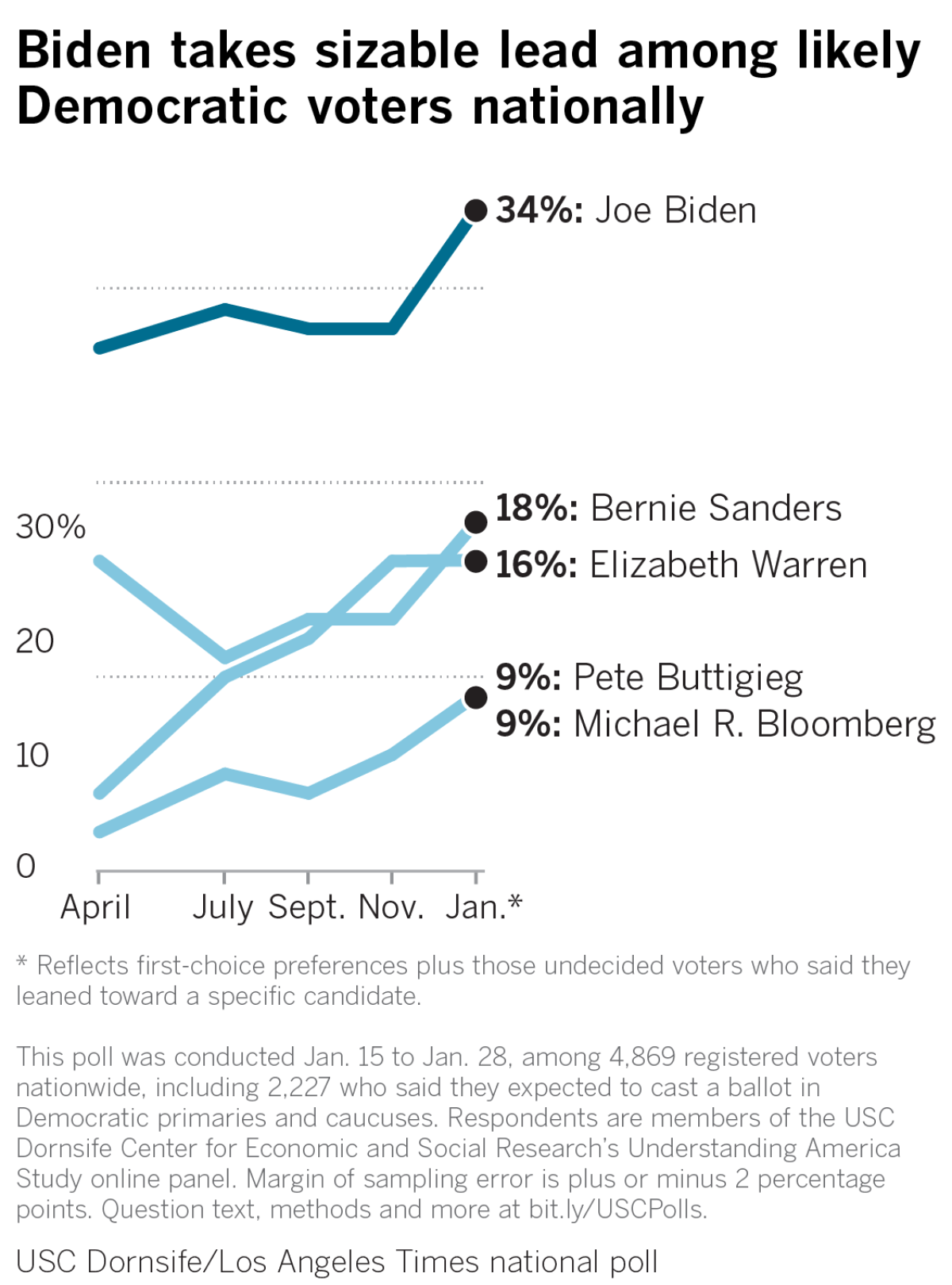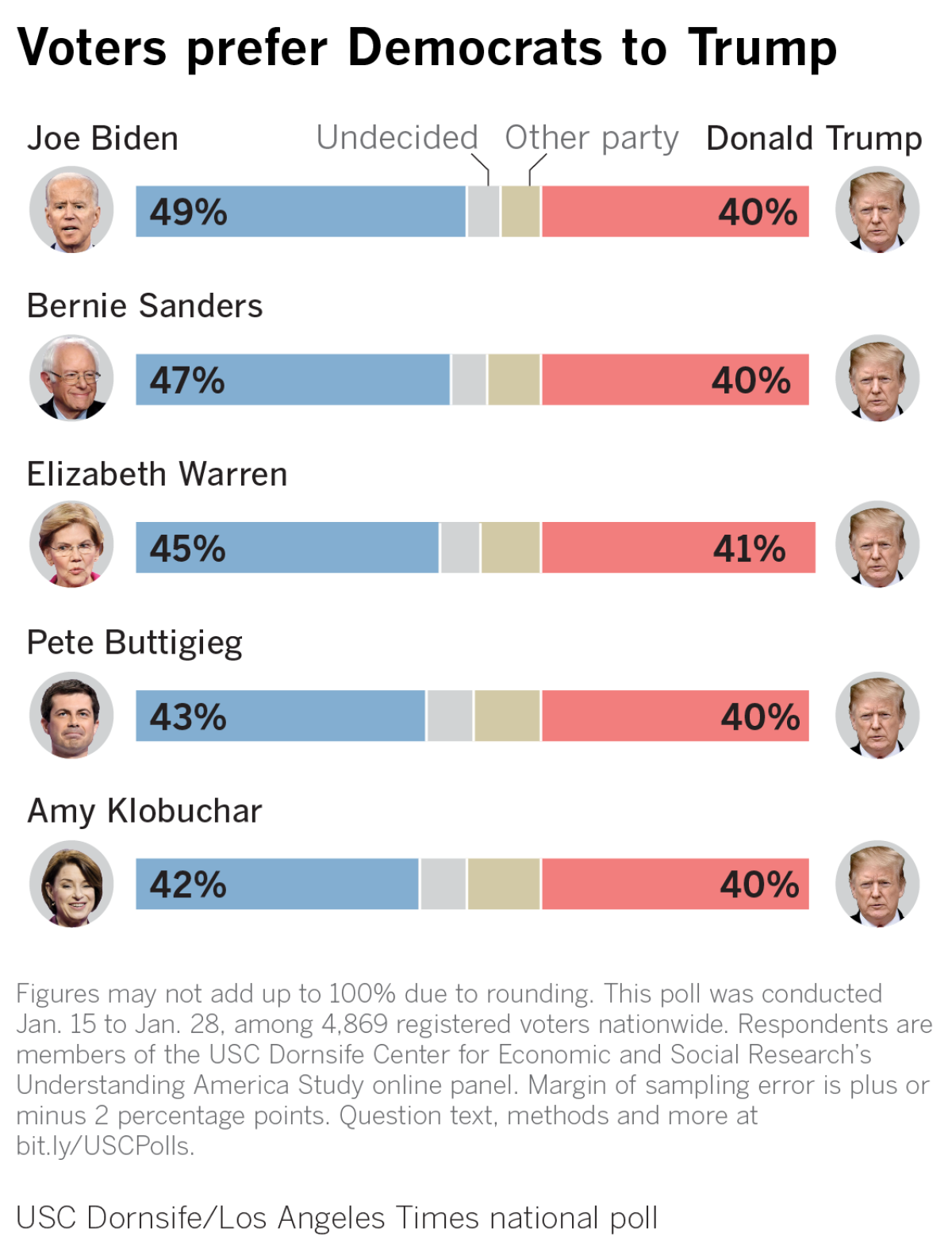Joe Biden holds lead in national poll: Is it a firewall against Iowa, New Hampshire losses?

- Share via
WASHINGTON — Former Vice President Joe Biden holds a substantial national lead over his opponents in the Democratic presidential campaign, buoyed by support among voters whose top priority is to beat President Trump, according to a new USC Dornsife/Los Angeles Times poll.
The nationwide poll comes just days before the first votes of the 2020 nominating contest are cast in the Feb. 3 Iowa caucuses, and many voters are agonizing over which candidate would be best equipped to beat Trump.
Even as polls in Iowa and other early voting states, as well as California, show a much closer race in those places, where Sen. Bernie Sanders of Vermont has gained ground, Biden’s support among black voters and people who want a candidate who can beat Trump have kept him in the lead nationwide, the new poll finds.
Backing from those groups, which significantly overlap, could help Biden weather political storms if he has a weak showing in Iowa on Monday and, a week later, in the New Hampshire primary, where polls show the former vice president also faces stiff competition.

“If he could win Iowa, he would have a pretty good path to the nomination,” said Bob Shrum, director of the Center for the Political Future at USC, which sponsored the poll. “But if he loses Iowa or performs poorly there, will these [national] numbers change, or are they a firewall?”
The new poll, however, also backs up a key argument made by Biden’s top rivals — that he is not the only one who could beat Trump. The survey found that Sanders and Sen. Elizabeth Warren of Massachusetts also outpolled Trump in hypothetical head-to-head matchups, although by narrower margins than Biden.
Biden’s electability argument is not faring so well in delegate-rich California, where the Democratic electorate is especially liberal. A new UC Berkeley Institute for Governmental Studies poll for the Los Angeles Times put Sanders in the lead, backed by 26% of people likely to vote in the state’s March 3 Democratic primary, followed by Warren with 20% and Biden trailing with 15%.
Overall, the nationwide poll finds the top-tier candidates aligning in much the way they did when USC last polled in October. Among likely Democratic primary voters, 34% say they support or are leaning toward Biden. Sanders and Warren are essentially tied, with 18% and 16%, respectively; Pete Buttigieg trails with 9%; Amy Klobuchar gets 3%.
The biggest change in the candidate lineup comes in the emergence of Michael R. Bloomberg, the billionaire businessman and former New York mayor, who in November made a late entrance into the race. He has already caught up to Buttigieg, the poll found, drawing support from 9% of likely Democratic primary voters. Like Biden, his strongest selling point is his perceived electability: 24% of Bloomberg’s voters say they chose him because they believe he could beat Trump. Half as many said they picked him because he shares their values.
Because the USC survey questions the same panel of people each poll, it can keep track of how their preferences change over time. An analysis of Bloomberg’s supporters finds that 38% of them had backed Biden in October; 22% had backed Warren; and 22% had been undecided.
With the primary season about to begin in earnest, the ranks of undecided voters are dwindling. The poll finds 14% remain undecided, down from 21% in October. Those who remain on the fence seem most likely to go to Biden: When asked who they would pick if they had to decide today, 26% said Biden, 16% said Sanders, 9% said Warren. Buttigieg and Bloomberg each got 7%.
The field has shrunk over the last few months as low-polling candidates began to drop from the race. Sanders, Biden and Warren all got a boost after former Rep. Beto O’Rourke quit in November: most of his backers now support one of the three.
Warren got the biggest boost when Sen. Kamala Harris of California left the field in December, with 29% of the people who backed Harris in October now supporting Warren. Buttigieg picked up 16% of Harris’s voters, while 13% went to Biden and 16% to Sanders.
It is less clear who will benefit most from Sen. Cory Booker of New Jersey ending his campaign in January. More than half of his supporters remain undecided.
Booker and Harris, who are both black, had hoped to challenge Biden for support among African Americans. But Biden, who benefits from having served eight years as vice president to President Obama, has kept a firm grip on this key demographic: The poll finds that 53% of black voters support Biden, compared with 19% for Sanders and 10% for Warren.
Black voters make up a majority of the Democratic electorate in some southern states and a large share of the vote in the large industrial states of the Midwest and Northeast.
But Sanders is making progress reaching out to other communities of color: Among Latino voters, Sanders ties Biden, with 28% backing Biden and 29% backing Sanders.
Although Warren is making a more direct appeal to women in her closing campaign argument in Iowa, the poll finds her lagging behind Biden among female voters. Warren runs strongest among white women: 21% back Warren, second only to the 27% who favor Biden. But Biden has a gigantic lead among black women: 53% support him, compared with 18% for Sanders and 12% for Warren.
“The theory that women vote their genetic code is not what the voters tell us,” said Mike Murphy, a Republican strategist who co-directs the Center for the Political Future.
Asked the main reason behind their choice of a candidate, 17% of voters say their preferred candidate “represents my own values and beliefs very well;” 17% say the candidate “has the best chance of defeating Donald Trump;” and 15% say the person “is the best candidate to bring major changes to the U.S.”
Among people voting their values, Warren did best, winning 27%.
Biden ran away with voters who gave priority to beating Trump, with 67% of them backing him. The newcomer, Bloomberg, came in second among beat-Trump voters with 14%, a hint of hope for the late entrant should Biden falter.
But Bloomberg seems to inspire less enthusiasm among Democratic voters than other, better established candidates.
When Democrats were asked to rate on a scale of 0-100 how enthusiastic they were about their choice of candidates, supporters of Biden, Sanders, Warren and Klobuchar averaged more than 60; Bloomberg supporters averaged 47. Similarly, on a 0-100 scale measuring overall excitement about the campaign, Bloomberg voters, averaged 47 — on the bored side — while Biden, Sanders and Warren voters averaged close to 60
Looking ahead to the general election, when voters of both parties were asked to choose between Trump and each of five top Democratic candidates, the challengers all outpolled the president, but only Biden, Sanders and Warren did so by a statistically significant margin.

Biden fared slightly better than progressive stalwarts Sanders and Warren. Trump trailed Biden by 9 percentage points, Sanders by 7 points, Warren by 4 points, Buttigieg by 3 points and Klobuchar by 2 points, the poll found.
Those hypothetical matchups underscore the importance of gender in 2020: Women favor all of the Democrats over Trump by double-digit margins. Men back Trump, but by single-digit margins.
At a time when Democrats are debating whether it would be harder for a woman to beat Trump, the poll found that Trump got more support from men when he was matched against a woman. Men favored Trump by 1 point against Biden, 5 points against Sanders and 6 points against Buttigieg. But men favored the president by 7 points against Warren and 9 against Klobuchar.
The USC Dornsife/Los Angeles Times poll was conducted Jan. 15-28 among 5,860 adult U.S. residents nationwide, including 2,227 who were considered likely to vote in the Democratic primaries and caucuses. The margin of error is 2 percentage points in either direction for the full sample and for the Democratic primary sub-sample.
Respondents were drawn from a probability based panel maintained by USC’s Center for Economic and Social Research for its Understanding America Study. The poll was conducted in partnership with, and funded by, the USC Dornsife Center for the Political Future. Responses among all U.S residents were weighted to accurately reflect known demographics of the U.S. population. A description of the methodology, poll questions and data, and additional information about the poll are posted on the USC website.
More to Read
Get the L.A. Times Politics newsletter
Deeply reported insights into legislation, politics and policy from Sacramento, Washington and beyond. In your inbox three times per week.
You may occasionally receive promotional content from the Los Angeles Times.











